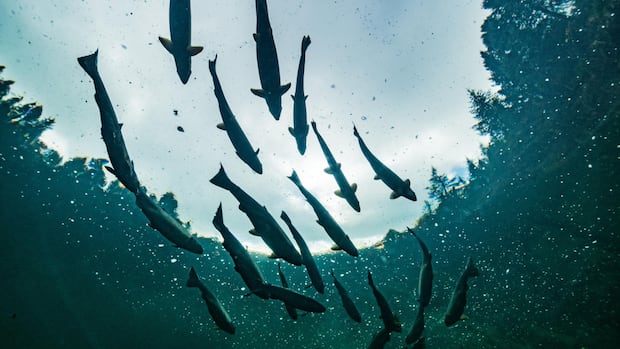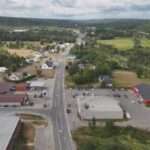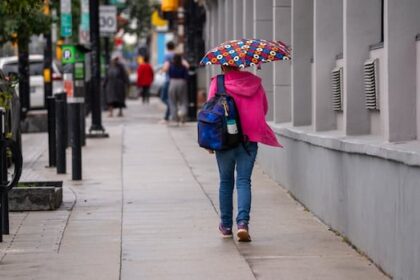New BrunswickAugust has been a hot and dry month that hasn’t favoured Atlantic salmon. Water temperatures in the Miramichi River reached 30 C, a deadly extreme for salmon.Water temperature in one part of the Miramichi River passed 30 C this monthOliver Pearson · CBC News · Posted: Aug 28, 2025 5:00 AM EDT | Last Updated: 14 minutes agoSalmon have been getting lots of sunlight this summer as water temperatures warmed to lethal highs of over 27 C. Shade from trees helps them. (Submitted by Nick Hawkins)On Aug. 11, Miramichi was the hottest spot in Canada, with a temperature just over 37 C, almost breaking a 150-year-old record.Temperatures that high can be unsafe for humans, but for the Atlantic salmon that swim through the Miramichi River system, it can be a death sentence.Water temperatures around 30 C are lethal for salmon, which prefer conditions under 20 C, according to David Roth, the New Brunswick program director for the Atlantic Salmon Federation.How much time a salmon has before the warm water kills it depends on a few factors.”It highly depends on life stage, how old the fish is, how many heat events prior in the season the fish has experienced … If all the bad factors come together, it can be very fast even within minutes in the worst-case scenario.”The Department of Fisheries and Oceans estimated water temperatures in the northwest part of the Miramichi River at more than 32 C on Aug. 11. That’s the highest since 2023.In the southwest part of the river, water temperature hit just over 29 C on Aug. 13, the highest the department has recorded since it started tracking temperatures there in August 2022.WATCH | Warm water can kill salmon ‘within minutes,’ biologist says:A warm Miramichi River can be lethal for salmonWarm water in the Miramichi River can be a death sentence for Atlantic salmon. DFO says it tracked water temperatures of about 30 C during New Brunswick’s August heat wave.Salmon are a cold-water species that can’t regulate their internal temperature. During heat events, they have to find cold water in the river quickly. Roth hasn’t heard of any dead fish on the river, but Miramichi Salmon Association president Butch Dalton suspects there will be some.Because the river was closed to fishing when water was too warm and Crown land was closed until recently as a precaution against wildfires, there haven’t been as many eyes in the field to spot or report salmon deaths, Dalton said.The Southwest Miramichi recorded water temperatures around 30 C, according to the Department of Fisheries and Oceans. (Nathan Wilbur/Submitted by Atlantic Salmon Federation)He said warming water could be damaging to a Miramichi salmon population already at a record low. A federal fisheries report from this year said adult salmon, returning to the Miramichi each year from 2012 to 2024 have declined 64 per cent. In 2012, there were around 13,630 fish and now there are just under 5,000.The population of salmon that has spent one winter in the ocean before returning is in worse condition, with a 79 per cent decline in the southwest branch of the river and a 86 per cent decline in the northwest branch.Only about 1,500 of those one-winter salmon are left between the two branches.In New Brunswick, anglers are limited to catch-and-release for sea-run Atlantic salmon in all waters.Anglers are allowed back on the water after two phases of closures, beginning on July 25, kept parts of the river closed. It reopened on Tuesday. (Tom Montgomery/Submitted by Atlantic Salmon Federation)Fisheries kept the Miramichi River closed to angling for all species of fish from Aug. 11 to 26. The department had closed 29 cold-water pools in the Miramichi on July 25, but they are now reopened.The Miramichi River experiences periods of warm water every summer, usually in July and August, which has led to closures to fishing, but Dalton said this month’s temperature numbers were especially high.”It’s pretty unusual for temperatures to get that high. We haven’t had a warm water event like that, where we’ve seen such extreme temperatures, in quite a few years.”The Miramichi had closures for 31 days last summer.The Fisheries Department follows a warm-water protocol in deciding whether to close the river to fishing, and there are two phases.In the first phase, when water temperature is between 20 C and 23 C for two consecutive days, cold-water pools are closed. In the second phase, when temperatures exceed 23 C for two consecutive days, morning-only angling is implemented in places not already closed.Roth sits on the Warm Water Protocol Committee alongside the federal department, the Miramichi Salmon Association and other groups. The committee meets and makes decisions on river closures.He said the water level has been low this August, which only makes temperatures warmer.”We have really, really low water levels as well … warm water and low water often coincides,” Roth said.Salmon need time to recover after being warmed and more hot water events bring their temperature tolerance down.”There’s a lot of factors at play but the main issue that they encounter in warm-water temperatures are the low oxygen concentrations in the water,” Roth said.Roth is working on a project that tracks juvenile salmon during hot-water events and how they navigate to cold water. He said it’s possible the study will show how salmon die during extreme heat events.David Roth, New Brunswick program director with the Atlantic Salmon Federation, says he is working on a study about juvenile salmon, who need to seek refuge from warm water. (Submitted: David Roth)Juvenile salmon will travel kilometres to find suitable temperatures, Roth said.When juveniles have to leave their territory to get to cold water, it opens them up to predators like such as smallmouth bass, an invasive fish that is not harmed by warmer water, he said.More warm waterLike wildfires in the province, extreme temperatures on the water may be something New Brunswickers will have to get used to.”Unless there’s some sort of change in the climate and we can reverse things, then I suspect we’ll be looking at increasing temperatures through the summer,” Dalton said.Butch Dalton, the president of the Miramichi Salmon Association, says he expects warm water will bring more salmon angling closures in the years to come. (Aniekan Etuhube/CBC)The natural tree shade on the riverbanks is important to keeping the water cool.Dalton said in the future wildfires near the river and its tributaries could reduce the shade and ruin the cold-water pools salmon rely on for refuge.Organizations like the Miramichi Salmon Association are working to restore existing cold-water pools.”We’ve restored a number of Atlantic salmon pools around the Miramichi,” Dalton said. “We go back every year to make sure they’re functioning the way they are, the way they should be.”ABOUT THE AUTHOROliver Pearson is a reporter at CBC New Brunswick. He can be reached at oliver.pearson@cbc.ca
Warm water threatens record-low Miramichi salmon population











